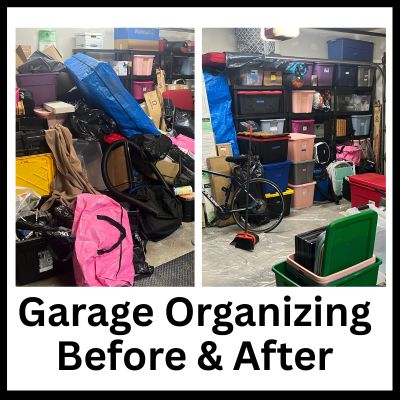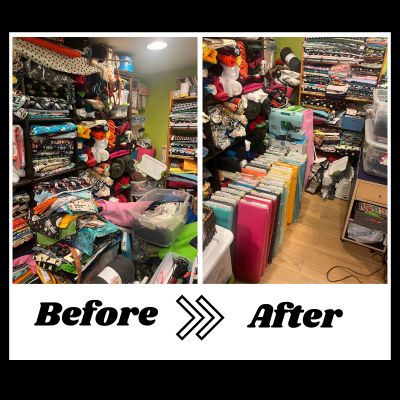Home Organizing For Couples

Home organization can bring a lot of stress to relationships, no matter how big your house is or how long you’ve lived together. Differing levels of tidiness, busy schedules, and personal attachments can all contribute to tensions. If clutter and disorganization have come in between you and your partner, and you’re ready for a change, keep reading this post.
Get On the Same Page
Often times, it’s one partner who really wants organizational change, and the other person is more resistant or feels defensive. Other times, both people want to get organized, but they just don’t know how or can’t do it for a variety of reasons. Depending on the commitment level of both people, you may need to have several conversations before anything can be agreed upon. The first step is to have an open and honest conversation about how the disorganization makes you feel. If you cannot get on the same page about the organizing right now, rather than forcing your partner to change (or making changes to their stuff without their consent), only focus on your stuff (more on this below).
Take Some Time Out to Evaluate and Reset
Once both people are on the same page, take some time to plan out what changes need to happen, and try to create a realistic timeline for when the work can get done. I say this cautiously, because it’s easy to underestimate how long things will take to get gone through, and it can be hard to anticipate hiccups. Carve out time on your calendar to put the work in. If weeknights are always filled with errands and working late, and weekends are filled with fun activities or schlepping the kids to their activities, you will need to make a change to your schedule. What are you willing to give up or put on pause so that you can make time to get organized? If getting organized really is a priority for you, put it on your calendar, and stick to it!
Be Clear On Responsibilities For Chores
Chores and household responsibilities can become a major source of resentment if expectations aren’t clear. Sit down together to discuss who is responsible for what, and create a chore chart. Honor those agreements. Take into account other responsibilities that happen outside of the normal tidying chores, such as childcare, cooking, caring for elderly parents, and working at a job. Time spent volunteering and on hobbies is important for personal growth and happiness. Just make sure that everything feels balanced. Otherwise, resentments can fester. It’s also important to take into account the fact that one person may have more capacity to “do more”. Make a list of all the chores that need to get done, and be as specific as possible when assigning a person to a task. Do what you say you’ll do. Reevaluate as needed.
Be Clear On Boundaries For Personal and Shared Spaces
One of the biggest sources of frustration between couples is a lack of clear boundaries. Untangle mixed areas of stuff so you are very clear about what is getting stored and who’s it is. It can be easy to say “oh, that’s all my husband’s crap”, but upon a closer look, it’s actually yours. If you’ve been experiencing a lot of tension regarding home organization with your partner, you’re going to need to be deliberate on who gets what real-estate, and what things are allowed in common areas. Some couples don’t need to be quite as strict, but if you’re trying to form new habits, it’s better to be very conscientious about what’s allowed and what’s not.
Make Personal Spaces So Each Person Has a Place to Call Their Own
When things are too tangled and overlapping, it creates unhealthy enmeshment and a loss of autonomy. Everyone needs their own personal space. Things get very messy when personal spaces get infiltrated with someone else’s stuff. Having a personal space will also help reinforce personal identity which will lead to a stronger sense of self and greater confidence. This will impact the relationship positively.
Make Space (and Time!) To Do the Things You Love, Both Separately and Together
For the health of your relationship, it’s so important to do the things you love. Have some things you like to do together, and have some things you like to do independently. Spending the quality time doing the things together will help improve your bond, your communication, and your overall satisfaction with life. Doing things you love that don’t involve your partner will help intellectually stimulate you and will make you a happier person. Whether you do these things in your home or just store your supplies/equipment in your home, it’s important to make sure these spaces are accessible and well-organized so that you can actually do them!
Lead By Example
When we are frustrated, why do humans automatically focus on things other people doing wrong rather than their own mess? This happens because it’s easier to externalize frustration than to self-reflect. It’s easy to get frustrated with your partner’s messes, but fixating on them won’t help. Only focus on what you can control (your stuff and the chores you’ve committed to doing). Don’t dwell on someone else’s mess. Redirect your energy towards maintaining your end of the bargain. Respect your partner’s stuff and their personal space. No matter how tempting it is, don’t throw someone else’s stuff out without their permission.
Final Thoughts
A well-organized home can relieve a lot of tension in relationships if it is organized with love and compassion. A well-organized home WILL NOT work well for both people if it is done with anger, resentment, and judgment. Treat each other with patience and respect. Accept the things you cannot change about your partner. Small changes can lead to big improvements- not just for your home, but for the health of your relationship as well.

Posted By Jean Prominski, Certified Professional Organizer
- Follow me on Instagram @seattlesparkle
- Join my Facebook Group, Declutter and Organize with Seattle Sparkle.
- Ready to book a consultation? Complete this form.




